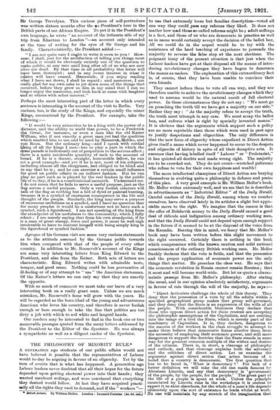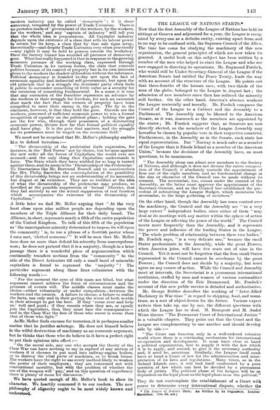THE PHILOSOPHY OF M.Il'iORITY RULE.* A GENERATION ago students of
our public affairs would not have believed it possible that the representatives of Labour would to-day be arguing in favour of an oligarchy. Yet by the turn of events that is what has happened. A generation ago Labour leaders never doubted that all their hopes for the future depended upon getting electoral power into their hands ; they wanted manhood suffrage, and were convinced that everything they desired would follow. At last they have acquired practi- cally all the rights they used to demand, and if the " workers "— Aired Action. By William Mellor. London : Loonardrazions. 14a.6d. not.] to use that extremely loose but familiar description—voted all one way they could Taos any reforms they liked. It does not matter how mad those so-called reforms might be ; adult suffrage is a fact, and those of us who are democrats in practice as well as in name would certainly accept the-decision of the ballot box. All we could do in the sequel would be to try with the assistance of the hard teaching of experience to persuade the majority to reverse the false step at the next elections. The poignant irony of the present situation is that just when the Labour leaders have gotat their• disposal all the means of-intro- ducing revolutionary changes they have begun to denounce the means as useless. The explanation of:this extraordinary fact is, of course, that they have been unable to convince their own friends.
They cannot induce them to vote all one way, and they are therefore unable to achieve the revolutionary changes which they used to assume would be the natural result of full electoral power. In these circumstances they do not say : " We must go on preaching the truth till we have got a majority on our side."
Rather they say : " As the majority refuse to accept the truth, the truth must triumph in any case. We must scrap the ballot box, and enforce what is right by specially invented means." It is obvious that the arguments which support such a policy are no more reputable than those which were used in past ages to justify despotisms and oligarchies. The only difference is that the new form of oligarchy whose expedient is Direct Action gives itself a name which never happened to occur to the despots and oligarchs of history in spite of all their deceptive arts. It assumes that having labelled itself " Labour " or " Proletariat," it has quieted all doubts and made wrong right. The majority are to be crowded out. They do not count--wretched poltroons who refuse to vote for their own happiness and wealth!
The more intellectual champions of Direct. Action are busying themselves in evolving quite a philosophy in defence and praise of this plan. A very good example is Mr. William Mellor's book.
Mr. Mellor writes extremely well, and we see that he is described in advertisements as "Industrial Editor " of the Daily Herald. Careful readers of the Daily Herald, among whom we number ourselves, have observed lately in its articles a slight but appre- ciable move to the right. We imagine that the reason is that the offer of Bolshevik money to the Daily Herald caused a good deal of ridicule and indignation among ordinary working men, and that the Daily Herald could not depend upon enough support in the future if it seemed to be at the disposal of the voice from the Kremlin. Bearing this in. mind, we fancy that Mr. Mellor's book may have been written before this slight movement to the right occurred. Certainly there is nothing in this book which compromises with the known caution and solid national consciousness of the ordinary British working man. Mr. Mellor frankly declares that the vote is futile, and that the possession and the proper application of economic power are the only things that matter. He preaches the class war. He says that the economic revolution in Russia cannot remain Russian ; that it must and will become world-wide. But let us quote a charac- teristic passage from Mr. Mellor's philosophy. After stating the usual, and in our opinion absolutely satisfactory, arguments in favour of rule through the will of the majority,_ he says :— " Direct Actionists challenge the whole of this theory. They deny that the possession of a vote by all the adults within a specified geographical group makes that group self-governed, and they deny that the State is an expression of the wills of all the people. With considerable bluntness they declare that those who oppose direct action for these reasons are accepting the philosophic assumptions of the Capitalists, and are erecting into the image of a God the State, which is merely part of the machinery of Capitalism. It is, they declare, dangerous to the success of the workers in the class struggle to attempt to make them believe that democratic forms absolve them from the necessity of employing their economio power, and still more dangerous to support the doctrine that the State stands in some way for the greatest common multiple of the wishes and desires of the citizens. There is, in short, a cleavage of philosophy and outlook, and that cleavage explains both the advocacy and the criticism of direct aetion. Let us examine the argument against direct action that arises because of a belief that a country is democratic. The first question that has to be faced is, ' What is democracy ? ' For lack of a better definition we will take the old one made famous by Abraham Lincoln, and say that democracy is government of the people, by the people, for the people.' The great part of the life of a people is spent at work. Unless the principle enunciated by Lincoln runs in the workshops it is useless to expect it to exist elsewhere, for the whole of a man's life depends ultimately upon this sort of existence he leads whilst at work. No one will maintain by any stretch of the imagination that modern industry can be called democratic' : it is sheer autocracy, tempered by the power of Trade Unionism. There is no pretence made of government of the workers, by the workers, for the workers,' and any captain of industry ' will tell you that the whole idea is preposterous. " All Capitalist industry depends upon the existence of a class that sells its labour power in return for its keep, a class that by that sale signs away, theoretically—and despite Trade Unionism very often practically —any rights it may be held to possess outside the workshop. Once the factory buzzer has sounded all pretence of democracy goes. What has really happened is that in response to the growing economic pressure of the working class, expressed through Trade Unionism in its various forms, the class that controls politics because of its control of property has in its own interests given to the workers the shadow of freedom without the substance. Political democracy is founded to-day not upon the fact of economic equality and industrial self-government, but upon the old principle that in a struggle the dominant party often finds it politic to surrender something of little value as a security for the retention of something fundamental. In a sense it is true that any extension of the franchise represents an advance by the workers in their struggle for freedom, for such an extension does mark the fact that the owners of property have been compelled to meet their enemy in the gate. The fly in the ointment, however, is that they hold the gate. Outside are the -workers, pbssessed of sufficient economic power to win a formal recognition of equality on the political plane ; holding the gate are the few who, through their possession of a dominating economic power, dictate how far that formal political equality shall have play. It is the gate that matters, and the struggle for its possession must be waged on the economic field."
We must not be surprised that Mr. Mellor's philosophy enables hist to defend terrorism:— "The dictatorship of the proletariat finds expression, for instance, in the ' Red Terror ' not by choice, but because against the new order all the forces of Capitalism the world over are aroused—and the only thing that Capitalism understands is force. The State which they have wielded for so long is turned against them, and its name is the Dictatorship of the Proletariat.' To libertarians like Mr. Bertrand Russell and to emotionalists like Mrs. Philip Snowden the contemplation of the possibility of this dictatorship brings not an understanding of its necessity, but disgust at its existence. They are so terrified at the idea of what the dictatorship of the proletariat may produce, so horrified at the possible suppression of formal' liberties, that they fail entirely to see the actual suppression of real freedom which accompanies the existence of the dictatorship of Capitalism."
A little later we find Mr. Mellor arguing that " At the very least close upon nine million people are depending upon the members of the Triple Alliance for their daily bread. The Alliance, in short, represents nearly a fifth of the entire population of the United Kingdom. To talk of this fifth of the population as ' the unscrupulous minority determined to impose its will upon the community ' is, to use a phrase of a Scottish pastor whom I once met, ' clotted nonsense.' " It will be seen that Mr. Mellor here does no more than defend his minority from unscrupulous- ness ; he does not pretend that it is a majority, though in a later passage there is a wonderful piece of argumentation which continually transfers sections from the " community " to the side of the Direct Actionists till only a small band of miserable capitalists is found to represent the "majority " ! The particular argument along these lines culminates with the following words :- " For the moment the eyes of this mass are blind, but what argument cannot achieve the force of circumstances and the pressure of events will. The middle classes must make the choice—either voluntarily or under compulsion—between the workers and the owners. A failure to choose, a failure to realize the facts, can only end in their getting the worst of both worlds in their attempt to get the best. If they ' come over and help us,' well and good ; if they remain where they are, or openly join the Capitalists, then they must face the consequences— and in the Class War the fate of those who waver is worse than that of those who fight."
As Mr. Mellor finds excuses for terrorism, it is perhaps a smaller matter that he justifies sabotage. He does not himself believe in the wilful destruction of machinery as an economic argument, but he thinks that those who do believe in it have a perfect right to put their opinions into effect :- " On the moral side, any one who accepts the theory of the Class War can have nothing to say in reproof of any section of workers if it chooses to put sand into railway-engine boilers, or to destroy the vital parts of machines, or to break looms. The workers have the right to use every method likely to weaken the power of their employers ; they are concerned not with conventional morality, but with the problem of whether the use of the weapon will ' pay,' and on this question of expediency there is plenty of room for discussion."
We have quoted enough of Mr. Mellor's book to show its character. We heartily commend it to our readers. The new Philosophy of oligarchy ought to be most widely known and understood.



































 Previous page
Previous page